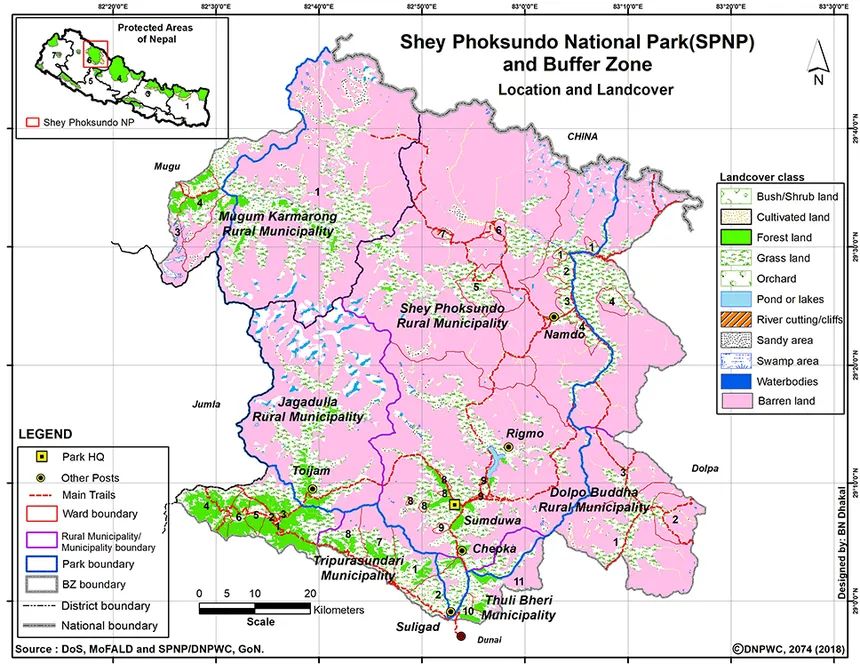Shey Phoksundo National Park
Explore Shey Phoksundo National Park in Dolpa, Nepal. Trek to Phoksundo Lake, spot wildlife, visit Shey Gompa, and experience Bon culture.
About the Park
Shey Phoksundo National Park is Nepal’s largest and only trans-Himalayan national park,established in 1984.and located in the remote Dolpa & Mugu Districts of western Nepal, The park covers 3,555 km² of pristine high-altitude Himalayan terrain.
Situated in the rain-shadow region of the Himalayas, the park features a unique dry alpine ecosystem, with elevations ranging from 2,130m - 6,883m, making Phoksundo National Park a key destination for trekking in Dolpa, Nepal and conservation.
Phoksundo Lake, located at 3,612m above sea levelin Shey Phoksundo National Park, Dolpa, Nepal, is the country’s deepest alpine lake, with a maximum depth of 145m. Renowned for its vivid turquoise-blue waters that change hues throughout the day, it is a major attraction for trekking in Dolpa and nature enthusiasts..
Declared a Ramsar Wetland of International Importance in 2007, the lake’s outlet forms Nepal’s highest waterfall at 167m (Nepal's highest), adding to the park’s unique natural beauty.
Shey Phoksundo National Park is home to approximately 9,000 people who Bon religion, Tibetan Buddhism, Local animistic traditions. The park features important spiritual sites, including the famousShey Gompa (4,200m) and Thashung Gompa, attracting pilgrims and cultural enthusiasts alike.
Ringmo village, located near the ancient landslide dam, showcases traditional Tibetan architecture and provides a glimpse into the region’s rich cultural heritage.
Ideal for blooming rhododendrons and clear Himalayan mountain views.
Offers stable weather, crystal-clear skies, and excellent trekking visibility.
Harsh conditions with heavy snowfall; trekking is not recommended.
Wildlife & Nature
Discover the incredible biodiversity of the trans-Himalayan ecosystem

Snow Leopard
Shey Phoksundo National Park is a critical habitat for the elusive snow leopard, an apex predator symbolizing the wildness of the Himalayan region.

Himalayan Blue Sheep
Himalayan blue sheep, often seen in the park’s rugged terrain, are agile and sure-footed, serving as a primary prey species for predators like snow leopards and Tibetan wolves.

Musk Deer
The park hosts musk deer, valued for their musk glands, which have made them a target of poaching in the past.

Alpine Meadows
The expansive alpine meadows of Shey Phoksundo National Park are adorned with vibrant wildflowers, creating a stunning and colorful scene across the high-altitude landscapes.

Rhododendrons
In spring, various rhododendron species bloom across the slopes of Shey Phoksundo National Park, adding vivid hues to the park’s natural beauty.

Juniper Forests
Juniper forests dominate the lower altitudes of Shey Phoksundo National Park, supporting a diverse range of fauna and contributing to the park’s unique ecology.

Himalayan Monal (Lophophorus impejanus)
The Himalayan Monal, also known as Danphe, is Nepal's national bird, featuring brilliant multicolored plumage in males and brown speckled females. It inhabits conifer forests and alpine meadows.

Satyr Tragopan
A vibrant red-and-black pheasant known for its 'horns' during mating displays, found in dense rhododendron and mixed conifer forests.

Cheer Pheasant (Catreus wallichii)
The Cheer Pheasant is a long-tailed, ground-dwelling pheasant found on grassy, forested slopes with scattered shrubs and open ground.

Kanjirowa Himal
Kanjirowa Himal is a stunning mountain range in Western Dolpa, known for its sharp peaks and glaciated ridges, visible during treks around Phoksundo and Upper Dolpo.

Mount Dhaulagiri
While not located in Dolpa, Mount Dhaulagiri is visible from high passes like Sangda La and Chharka La in southeastern Dolpa, offering breathtaking views.

Putha Hiunchuli (Dhaulagiri VII)
Putha Hiunchuli is one of the few 7,000 m peaks climbable in Dolpa, located on the eastern border with Rukum, attracting mountaineers preparing for higher challenges.
Park Map
Explore the layout and key features of Nepal's largest national park

Best Time to Visit
Plan your adventure for Spring (March–May) to enjoy blooming rhododendrons and clear skies, or Autumn (September–November) for stable weather and stunning views. Winter (December–February) brings harsh, snowy conditions, making trekking challenging. Monsoon (June–August) has less rain due to the rain-shadow effect, but trails can still be difficult.